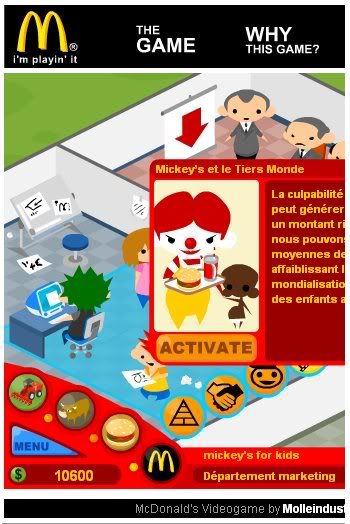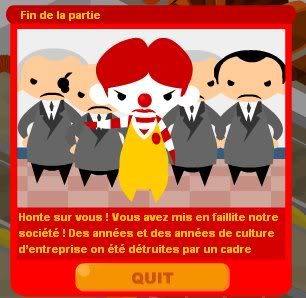When I read about the social impact games, I wondered how these simple games could inform in such a way to actually effect social change. It seemed like a good idea to get people learning interactively, but once I played the games I found that any sort of learning value extracted from the game play was nothing that couldn’t have been stated in one simple sentence. For example, “The McDonald’s industry uses unethical practices to maintain profits,” or “Kinko’s employees become bored and apathetic in their work environment.”
I played the McDonald’s game first and decided to play it in French to see how a French person, who is especially likely to hate McDonald’s, would be affected by this game. I spent a while clicking on random things to see what they did. In one place, an image appeared showing an evil McDonald with a starving African baby, which I found to be a powerful image.

Soon I was raising cows and harvesting crops. I thought this would bring me profit in no time, but I quickly lost money. I went to the cow pen and slaughtered cows by clicking on them. I thought this would bring me money because it meant I would be selling hamburgers, but instead a little person starting jumping up and down and screaming at me, and I continued to lose money. I went into the corporate board room and tried to adjust the budget, but nothing worked! When I went into the negative ten thousands, a mean scary McDonald face appeared shouting, “Shame on you! You’ve brought the company to bankruptcy! You’ve destroyed years and years of business culture.” I didn’t care that I had failed; I was proud to have single-handedly brought down a huge corporation that sells unhealthy food to the masses.

Next, I downloaded “Disaffected!” to my desktop and began to play. This game emulates working at Kinko’s. You’re supposed to wait for customers to walk in and then retrieve their mail package from the storage counter. It took me several tries before I was able to satisfy a customer. The clients get impatient quickly, I noticed, as a sort of ticking clock floating above each client’s head indicates.
The game allows you to switch between either of the two employees who are on shift, so that if one employee is closer to the counter you can switch to him and have him get the package for the client more quickly. The annoying part is that the two employees often get in each other’s way, and that slows down the whole process.
I usually brought the clients the wrong package at first, and then I would have to endure their angry shouts before trying again. If I failed again, they were out the door.
Social impact gaming seems to be a great idea, and I’m sure some games that choose the right topic and the right mode of game play can be effective. The games I played didn’t seem to make a bold statement or inform players of anything new or significant.
No comments:
Post a Comment